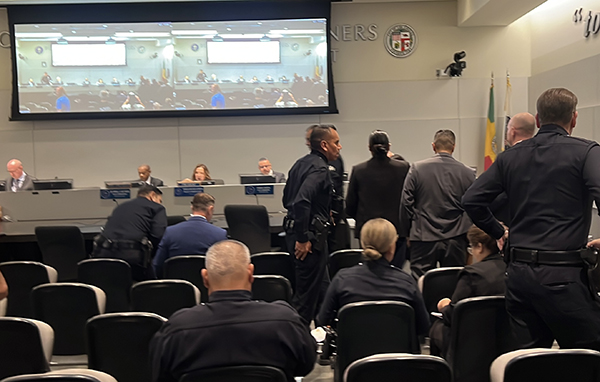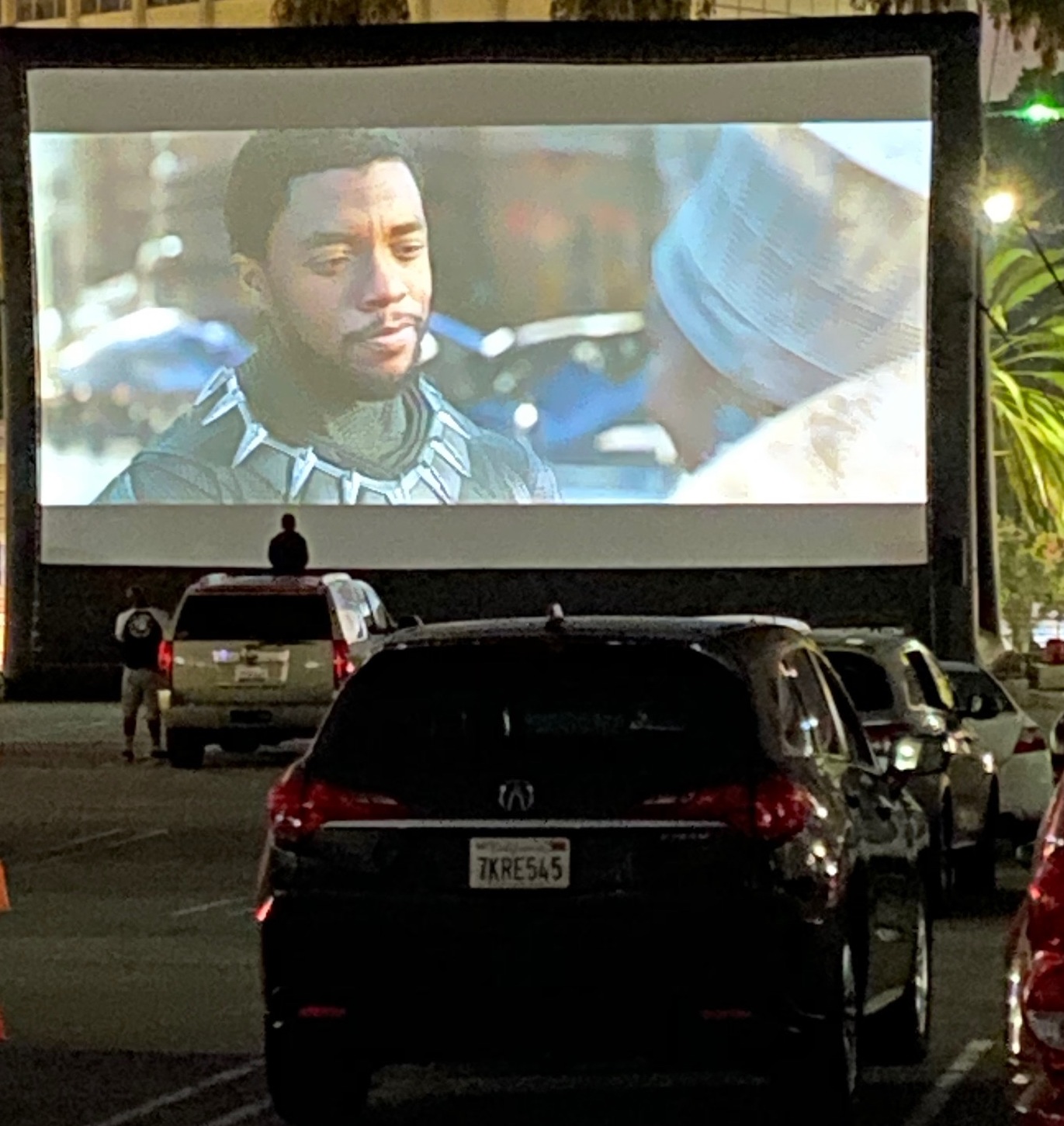Appointee set to face council vote Oct. 3

Members of the Los Angeles Board of Police Commissioners listen to public comment during a meeting Sept. 30 at LAPD headquarters in downtown Los Angeles. Officers stood along the walls as residents criticized the panel and Mayor Karen Bass’ bid to reappoint Commissioner Erroll Southers.
Photo by Stephen Oduntan
By Stephen Oduntan
Contributing Writer
LOS ANGELES — The City Council could vote as early as Oct. 3 to reappoint Erroll Southers to another term on the Police Commission.
Southers, a former FBI agent and counterterrorism expert who has served on the commission since 2018, has signed the city’s required ethics compliance paperwork, signaling that City Hall is moving forward on the reappointment even as opponents — including the founder of the Black Lives Matter Los Angeles Chapter — urge the council to block his return.
Inside the John W. Mack Hearing Room at Los Angeles Police Department headquarters Sept. 30, frustration spilled into the open. A full slate of residents lined up for public comment before the commission, many of them angry, some delivering profanity-laced remarks.
Along the back wall, uniformed Los Angeles police officers stood watch — some stoic, others betraying faint smiles — as speakers unloaded on the five-member civilian panel that oversees the department.
“You silence dissent, cutting off over 16 community members from speaking for two weeks straight. That’s not oversight, it’s censorship,” one commenter said, before denouncing what he described as cooperation with federal immigration enforcement: “You’re delivering immigrant kids on a platter to ICE.”
The sharpest attacks landed on Commission President Teresa Sanchez-Gordon. Several speakers, referencing recent media coverage of her undocumented upbringing, argued she invokes that narrative while sanctioning police violence.
Chants of “coward” erupted when she ended the session with many still waiting to speak. Seated beside her, Southers took notes but did not engage and left without speaking to reporters.
The meeting unfolded against the backdrop of Southers’ contested reappointment. If confirmed, his new term would run until June 2030. Critics also warn that under the City Charter’s 45-day rule, a mayoral nominee is automatically approved if the council fails to act in time.
Melina Abdullah, professor of Pan-African Studies at Cal State Los Angeles and co-founder of Black Lives Matter Los Angeles, said the meeting confirmed a shift that, in her view, limits accountability. She argued the current meeting format prevents the public from responding to official reports in real time and said both Southers and Sanchez-Gordon have enabled harmful policing practices.
“Had I been allowed to speak, my main point was that Erroll Southers should not be on this commission,” she said.
In an interview conducted ahead of the meeting, veteran community organizer Baba Akili recalled a confrontation at a prior commission session in the San Fernando Valley where, he said, Southers directed officers to eject him after he challenged the panel.
“At 76 years old, I was treated like a criminal for speaking up,” Akili said.
He said he was briefly handcuffed before police decided not to book him.
“Southers sees us as radicals to be contained, not residents to be heard. His expertise is in criminalization, not accountability,” Akili added.
Rev. James Thomas, co-founder of Clergy for Black Lives Matter and president of the San Fernando Valley NAACP, also spoke in an earlier interview about the commission’s broader trajectory. He argued that the body would better reflect the city if its members were elected rather than exclusively appointed.
“The purpose of the commission was for it to have everyday people, not law-enforcement insiders or political climbers,” Thomas said. “It ought to be elected, not stacked with the mayor’s appointees.”
Underlying much of the pushback is Southers’ professional identity. Beyond his service on the commission, he has built a long career in counterterrorism and homeland security, including senior roles at Los Angeles World Airports, the state Office of Homeland Security, and USC’s Price School of Public Policy.
Supporters say that background equips him to scrutinize the department while understanding its complexities; they point to past statements in which he backed firm discipline and permanent removal for officers who violate public trust.
Opponents counter that his writings on “radicalization” among Black and Muslim communities import a security framework into civilian oversight. They argue this perspective treats dissent as a threat to be managed rather than a voice to be heard, deepening mistrust between the commission and the communities it serves.
The political dynamics are equally fraught. Mayor Karen Bass has praised Southers in the past for his public-safety expertise and leadership, and City Hall’s administrative machinery appears to be proceeding apace — hence the recent ethics paperwork. Council President Marqueece Harris-Dawson approved a request to delay the City Council’s vote, delaying the matter to Oct. 2.
Critics say the extra days favor Southers by edging closer to the City Charter’s 45-day window for automatic approval if the council fails to act. His office did not respond to calls or emails seeking comment.
Between now and then, activists say they will keep showing up. Black Lives Matter–LA has circulated petitions, urged supporters to pack meetings, and promised to keep pressure on city leaders to reject a second term.
“Every time they shut us out, they prove why people like Southers don’t belong in those seats,” Abdullah said.
Whatever happens at City Hall at week’s end, the fight over Southers has become more than a personnel matter. It is now a test of Los Angeles’s vision for civilian oversight: whether the city prefers commissioners rooted in security expertise and institutional knowledge, or representatives drawn from communities that have long borne the brunt of policing and want power — and microphone time — shifted in their direction.
Stephen Oduntan is a freelance writer for Wave Newspapers.





